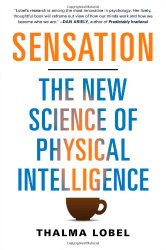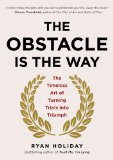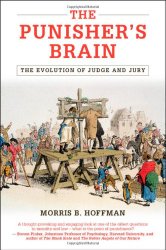
Sensation: The New Science of Physical Intelligence by Thalma Lobel (Atria Books, 2014)
(kindle ed.), (amazon.co.uk), (UK kindle ed.)
Book description from the publisher:
Color and temperature, darkness and light, rough and smooth textures—all these sensations influence your inner world and your actions with unexpected power. In Sensation, one of the world’s leading experts on human behavior, Dr. Thalma Lobel, shares an exciting, completely new view of physical intelligence, or embodied cognition. She reveals that physical experiences unconsciously affect your everyday decisions and choices—with profound implications for your everyday life.
Before you read the rest of this description, find a comfy place to sit and settle in with a mug of something warm. If you can, wrap yourself in a soft jacket, shawl, or blanket. Once you’re warm and cozy, you’ll warm to new ideas more quickly. Now listen: This book holds the power to change your life.
That sounds like a lofty claim, but if this book were ten pounds heavier, you might regard that claim as more believable. (Job seekers, take note: A resume printed on thin paper is taken less seriously than ones on thick paper.) If this copy were written
TOP
TO
BOTTOM
instead of SIDE TO SIDE
you’d be more likely to believe it. You might also pay more attention if this were printed on red paper—although that color would seriously undermine your reading comprehension. (Test takers, beware: Exposure to the color red significantly and consistently reduces performance. But a whiff of cinnamon may undo the damage.)
The more you know about how your physical environment influences your mind’s interpretation of the world around you, the better you are able to navigate tricky waters and get to where you want to go. People with a sweet tooth seem kinder than others. Clean smells promote moral behavior, but people are more likely to cheat on a test right after having taken a shower. Hard surfaces make us inflexible. Sensation empowers you to recognize these outside forces and hidden biases, and even put them to use in your own life, in order to improve every facet of your personal and professional lives. The outside world shapes our perceptions and beliefs at every moment; Sensation reveals these hidden effects and lets you take control of your place in the world.
Google Books preview:
See also: Author’s website






